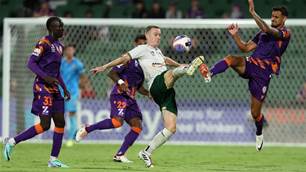There are three certainties in life: death, taxes and mistakes by referees.

The key finding of the arbiter concerned the FIFA laws which state at Rule 5:
1. The authority of the referee
Each match is controlled by a referee who has full authority to enforce the Laws of the Game in connection with the match.
2. Decisions of the referee
Decisions will be made to the best of the referee`s ability according to the Laws of the Game and the ‘spirit of the game’ and will be based on the opinion of the referee who has the discretion to take appropriate action within the framework of the Laws of the Game.
The decisions of the referee regarding facts connected with play, including whether or not a goal is scored and the result of the match, are final. The decisions of the referee, and all other match officials, must always be respected.
The referee may not change a decision on realising that it is incorrect or on the advice of another match official if play has restarted or the referee has signalled the end of the first or second half (including extra time) and left the field of play or terminated the match.
On a plain English reading of these laws there was no possible ground to upset the original result, despite it having been determined by error. However, the arbiter found that the local provisions of the Central Coast Association allow for the possibility that the apparently absolute flavour of the FIFA rules is subject to local amendment. The only example the arbiter gave for such departure from the plain language of the FIFA laws concerned disciplinary decisions, which to my mind are vastly different in character from game determining decisions (like whether a ball crossed the line) and intended to cater for indiscretions not picked up by the referee (normally in FIFA sanctioned tournaments televised and recorded by partners subject to very specific rules regarding that recording for disciplinary review).
It is also very interesting that the arbiter referred to the unofficial footage received by the association as part of the Woongarrah appeal. What exactly was the standing of that footage and where was the authority under the local rules to consider amateur footage generated outside the usual (highly prescriptive) FIFA provisions?
Ultimately, these are quibbling details.
It is difficult to argue with any great conviction that the final result is wrong, and yet…
Umina were extremely disappointed with the decision but they declined their opportunity for further appeal for a number of reasons. Most importantly, they didn’t want any further scrutiny of the referee who, despite his error, was acting in good faith and is regarded as a highly talented up and comer.
Next, they didn’t want to be party to an emerging culture of appeal. Do we really want to encourage a culture where every game is filmed with the potential for overturning Premier League Grand Finals…All Age semis…Over 45 comp matches…under 9s pre-season matches?
Where does it end and where, quite frankly, is the authority for the appeal in the first place?
The Umina Club, and most football fans everywhere, would surely agree that the referee’s decision must always be final, no matter how wrong. Referees suffer from a lack of respect as it is and if every decision can become the subject of appeal supported by iPhone evidence in the court of facebook, who on earth will ever want to become a ref?
No-one wins in this sad story, but I for one would recommend that Central Coast Football have a close look at their local regulations regarding overturning a referee’s decision and ask themselves: is that really what they meant?
If yes, then maybe there’s still time to replay that O45’s match and my team can still make the semis for 2013!
---------
Adrian’s latest book Political Football: Lawrie McKinna’s Dangerous Truth is in the shops right now or available through Booktopia. Adrian also wrote Mr Cleansheets.
Related Articles

A-League clubs in peril as APL prepares to wield financial axe

Wanted Monty puts Hibernian hurt behind him amid offers from Asia and Europe













